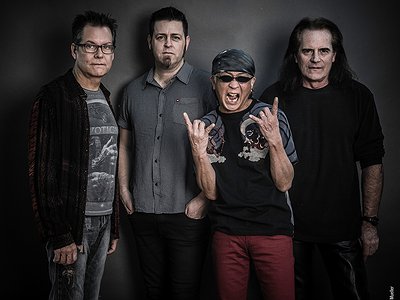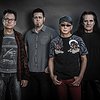Name: Spock's Beard
Members: Alan Morse, Dave Meros, Ryo Okumoto, Ted Leonard
Interviewee: Dave Meros
Nationality: American
Occupation: Bassist, Songwriter
Current Release: Noise Floor on Inside Out
Recommendations: I highly recommend the new Spock's Beard album "Noise Floor" :-)
I would also recommend a book that's a fairly long, dry reading but it is a pretty brilliant assessment of how the world's economy needs to change if we are to survive and support a middle class going forward. It is by Jaron Lanier, the book is titled "Who Owns The Future?"
Website / Contact: If you enjoyed this interview with Dave Meros of Spock's Beard, visit the band's website for music, album information, and news.
When did you start writing/producing music - and what or who were your early passions and influences?
Well, my writing has been pretty inconsistent throughout my life, I will write for a period of time then stop writing for sometimes a very long period of time. I write mainly because I see a need and also see that my writing will actually be used for something if it is good enough. Those are my motivations. I'm not one of those people that enjoy the process of writing, or have ideas constantly flowing from me that just have to be developed. When I do get into writing a song I go pretty deep psychologically, even when I don't need to, and it's a fairly exhausting process which I love and hate at the same time.
I remember writing my first stupid little 60s rock songs when I was maybe 9 or 10 years old, but those really don't count. Then in high school I did some writing and arranging, mainly in a jazz setting, for small combo and also for big band, so I guess I could say I started then. I am not very prolific though. I have never done an inventory, but I think I've written maybe 50 songs in my life.
Early passions and influences - well, I studied classical music at a young age and absolutely loved playing it but was never really passionate about the music itself. I first got passionate about music when I started hearing rock bands. First the Beatles and those first British Invasion bands, then even more when I started hearing artists like Led Zeppelin, Cream, Jimi Hendrix, etc. I went through a jazz phase in high school, I guess because I played brass instruments and had a lot of jazzer friends, then got back into rock for a while, got WAY into R&B of all types between maybe 25 - 35 years old, then finally settled into the attitude of "I like whatever is good".
What what is about music and/or sound that drew you to it?
I didn't know then and I still don't know. I mean, why do I like the color blue, or pizza? I'm sure there are scientific reasons, but I just like what I like and try not to overthink it.
For most artists, originality is first preceded by a phase of learning and, often, emulating others. What was this like for you?
For me it was sort of simultaneous, going back and forth between learning / emulating and trying to be original in very small, incremental steps. I remember all the way back to my first piano lessons, learning something very basic then thinking it was really cool to be able to play a chord, for example, and then trying the basic concept of what I had just learned in different ways. Learning to me has always been a way to grasp larger concepts more than anything else.
How would you describe your own development as an artist and the transition towards your own voice?
I guess the best description of me would be "musical schizophrenic". :-) I've bounced around between so many different styles of music and different instruments that I honestly couldn't teach another person how to play any one particular instrument because it's all bits and pieces of information that I've randomly cobbled together. And...I guess that's what would give me a little bit of individuality as well. The thing that gave me my own voice the most though, was the opportunity that Spock's Beard provided me. Previous to that I was not really known for any particularly unique sound or style, but Spock's Beard allowed me … or perhaps I should say … required me to develop something a bit more unique.
What is the the relationship between copying, learning and your own creativity?
I've always been a proponent of emulating others' styles and sounds, and I've never had a problem playing other people's music in cover bands. To me it's all seeing things from different perspectives, which is fascinating to me, and then developing more tools to work with. I grab little playing techniques and sound modifications and apply them to my own personality. Where would I be as a player if I hadn't studied Paul McCartney, John Entwhistle, Duck Dunn, Chris Squire, James Jamerson, Carol Kaye, Rocco Prestia, Marcus Miller, Louis Johnson, David Hungate, Geddy Lee, Larry Graham, and even lots of guys whos name wouldn't normally come up that I totally admire, like Tom Hamilton of Aerosmith for example, or Joe Puerta of Ambrosia. I am currently the bass player in Iron Butterfly and I really went to "Lee Dorman School" (Lee was the bass player during their classic years) to get in his head and explore his style and tonality, which is quite engaging really.
What were your main compositional- and production-challenges in the beginning and how have they changed over time?
Compositional challenges were, and still are, simply trying to come up with fresh musical ideas that are actually good. :-) Production challenges were many back in the 70s when I first started writing. Equipment was very expensive, studio time was expensive, so songs were normally worked out by the composer sitting with a live band and explaining basically what he had in mind and hoping the band would get it. The 80s were a step better, with all those cassette 4-track studios that were in every songwriter's home studio. Still lots of limitations with those. These days the main production challenge that songwriters face is how much time are they willing to spend in front of the computer to get to where they want to go. And of course, with all those tools and all those sounds at ones fingertips, being able to avoid falling into production habits and being able to have an open mind to other musicians input can be challenges.
What was your first studio like?
Yamaha 4-track cassette, Yamaha drum machine, Yamaha CP-70 piano, Yamaha DX-7 synth, Alesis and Roland effects units.
How and for what reasons has your set-up evolved over the years and what are currently some of the most important pieces of gear for you?
The 4-track cassette recorder was great for its time, but they really sounded bad and were very limited in what could be done with them. After a big blast of songwriting that I did in the late 80s until maybe '90 or '91 I stopped for a very long period of time, didn't get back into it until maybe 2003 or 2004, so I skipped a lot of transitional technology and went right to computer based recording. I've never really been a Mac guy, so I started with Cubase and that's still what I use.
I'm currently in another songwriting slump, so for the last couple of years what I use my studio for is mainly recording bass tracks. And these days I do everything "in the box", so my computer and digital interface are really my only pieces of recording hardware. I use Ampeg SVX pretty much exclusively for recording bass (a part of IK Multimedia's Amplitube software).
How do you make use of technology? In terms of the feedback mechanism between technology and creativity, what do humans excel at, what do machines excel at?
I usually adopt technology once it becomes popular and all the bugs are worked out. I'm not an early adopter by any means but learning new technology is a necessary part of being part of any aspect of society today, not just being a musician or being in the tech industry. For me, as a musician, technology has allowed me the luxury of doing things at my own pace, then living with what I've created for a while and make changes 100 times if I feel like it.
As a bass player, in the past, when the bands that I was involved with went into the studio, the primary purpose of the initial sessions would be to get drum tracks ... oh yeah, and bass tracks too (that was the basic attitude of the rest of the band usually). So we'd do all these takes over and over to get the perfect drum track. Then it would be time to do bass fixes, get different bass tones, etc, and that's when I'd have everybody looking over my shoulder, looking at the time, saying "yeah man, that's great, let's move on to the next song so we can get these drums done today!" right when I wanted to spend a few minutes trying a different bass or a different amp, or trying a couple different riffs.
Now I can sit here in my own little studio for an hour trying 8 different amp models, different mic models, different whatever. It is a HUGE time suck for me since I get a little obsessive over it, but to get back to your question, I can get as creative as I want when I'm on my own time, which technology facilitates. And, I can try something, hear it, build on it, record again, hear it, and eventually, through that self-feedback, get something that I'm going to be personally happy with.
Production tools, from instruments to complex software environments, contribute to the compositional process. How does this manifest itself in your work? Can you describe the co-authorship between yourself and your tools?
Like I said before, I like to record something, listen to it, make changes, record again, listen, etc. That gives me a really great auditing process that I don't really have otherwise. I tend to get involved in HOW I'm playing while I'm playing it, so I can't really be objective about it unless I stop playing and listen to it on playback, so that back and forth auditing process is a great tool for me when I'm by myself without the guidance of other human feedback. Having multiple instruments and seemingly infinite software also gives the player and songwriter a vast palette of sounds to choose from. That's both a blessing and a curse, but if one can manage not to get lost in the technology it's definitely a gigantic blessing.



